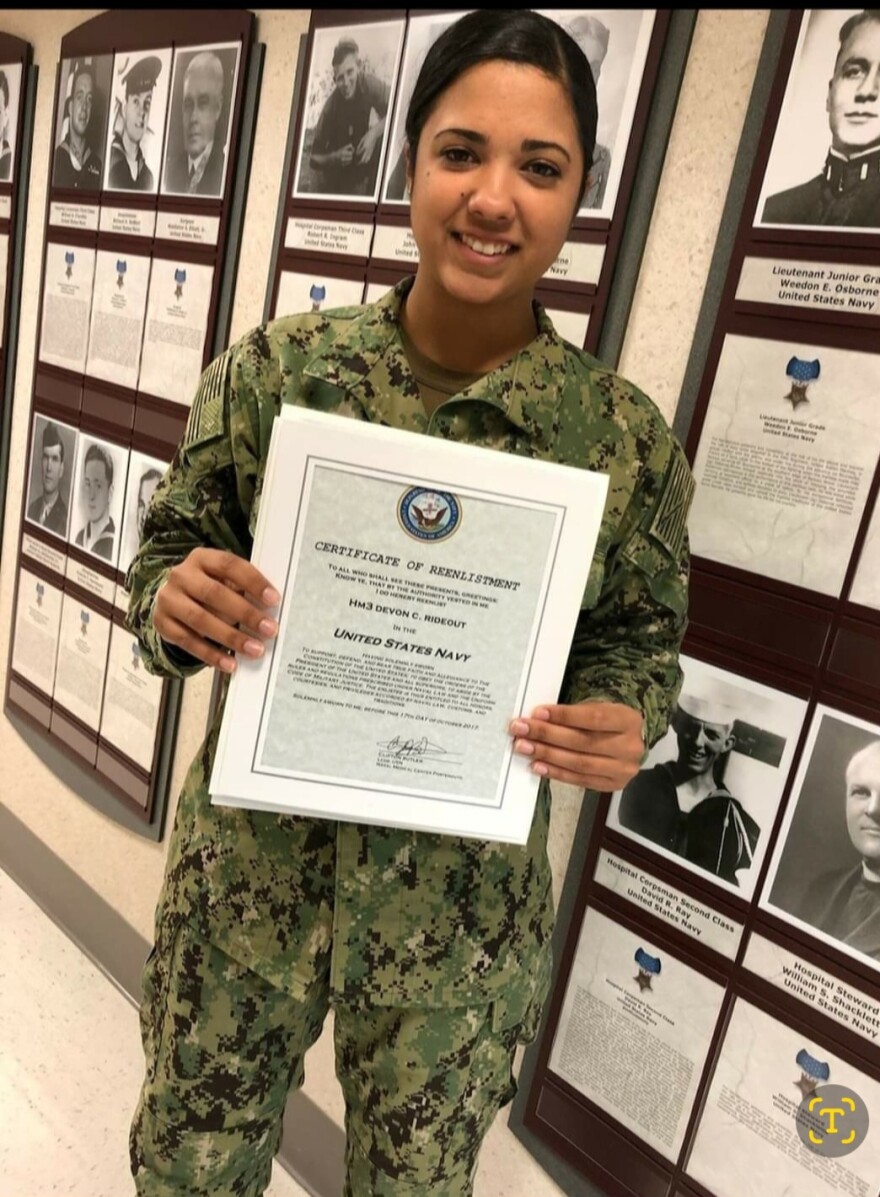Petty Officer 3rd Class Devon Rideout returned to her apartment in suburban Oceanside, California after her shift at Naval Hospital Camp Pendleton. It was the summer of 2018 and a Friday, just before 4 p.m. Like every afternoon, the 24-year-old Navy corpsman took her new puppy, Chip, for a walk.
When she returned, her upstairs neighbor — a man she did not know — was waiting outside her door. He was holding a revolver.
Rideout died just steps from her home in a quiet apartment complex popular with many service members working at nearby Camp Pendleton. Her killer, Eduardo Arriola, was a former Marine who’d been kicked out of the service two years before.
According to court records, Arriola deserted from the Marines in 2014. When he was caught in 2016 the Marines charged him with desertion. However, military psychiatrists found Arriola was delusional and having hallucinations. They diagnosed him with schizophrenia.
The Marines found him not mentally competent to stand trial at court-martial and separated him from the service.

That finding should have made Arriola a prohibited person according to the Gun Control Act of 1968 and landed him in the FBI's National Instant Criminal Background Check System — NICS. However, according to a pair of lawsuits brought by Rideout’s mother, that wasn’t done.
"I can’t even tell you the rage inside of me," said Leslie Woods, Rideout’s mother. "It was all premeditated. He should not have had that gun. He should have never had a gun legally."
Evidence in Arriola’s criminal trial revealed the man purchased a five-shot revolver at an Oceanside gun shop just weeks before killing Rideout. According to court documents, a list of names was found in Arriola’s car, including Rideout’s.
After shooting Rideout five times, Arriola stayed at the scene and wouldn’t let neighbors render aid as Rideout lay dying just steps from her front door. When police arrived, he told them she had been "trespassing."
Woods is suing the federal government and the state of California for negligence and wrongful death. Eugene Iredale, Woods’ lawyer, said the law is clear — Arriola should not have been allowed to buy a gun.
"In this case, all you needed was compliance with the law that has been in effect for over 30 years — the Brady Act," Iredale said. "That’s why we have such a powerful case."
According to the suits, even though the military failed to report Arriola to the FBI, in May 2018 his name was flagged by the California Department of Justice when the gun dealer submitted his information for the background check because of his 2016 arrest and desertion charge. The state then asked the Marines what the outcome of Arriola’s court-martial was.

The Marines told the state Arriola had been found incompetent to stand trial, according to an email exchange cited in the suit. But that was the end of the inquiry into Arriola, the suit says, and he was allowed to buy the gun.
The Pentagon has a history of noncompliance with the law said Lindsay Nichols, the policy director of the Giffords Law Center to Prevent Gun Violence.
"(It goes) back to the 1990s when the background check system was first established," Nichols said.
The Department of Defense Office of Inspector General — the Pentagon's internal watchdog — backs Nichols’ claim. Reports from the 1990s to 2017 found the Pentagon repeatedly failed to report service members to the FBI in accordance with the Brady Law.
The most well-known is the case of Devin Kelley, an Air Force airman whose 2012 domestic assault conviction should have landed him in the FBI’s system.
The Air Force failed to report him and in 2017 Kelley killed 26 people in the First Baptist Church of Sutherland Springs, Texas.
In 2022 a federal judge ordered the Air Force to pay more than $230 million to the families and survivors. In April, the case was settled for $144 million.
That shooting sparked change, the inspector general found. According to a 2020 report, prior to the Texas mass shooting, the services reported disqualifying criminal information to an internal Pentagon database but the information didn't always get to the FBI.
Now, service branches submit it to the FBI directly, the inspector general found.
Rideout’s killer was separated in 2016, so it’s unclear whether this change would have affected this case. However, in 2020 the inspector general only looked at the services’ compliance for reporting those service members who’d been convicted of disqualifying crimes.
Rideout’s killer wasn’t court-martialed and therefore never convicted. The inspector general hasn’t reviewed whether mental health adjudications are being reported to NICS, but a spokesperson said that did not fall under its law enforcement offices, but instead, it would fall under the military’s legal offices, which weren't included in the review.
For Woods, the loss of her only child has left her with little family. She moved from Northern California to Vista after her daughter was killed to be in the area she said Devon loved so much.
Her daughter is ever present in her mind.
"There's not a day that goes by — I just live in my memories of her," Woods said. "It’s hard for me to get out of myself — to focus on things. She never leaves my mind. Absolutely never."
Woods said she hopes the courts force the state and military to change their processes so no one else slips through the cracks.
"They need to take the law seriously.” Woods said. "(They’re) too big and powerful an entity — the military, the DOD, the government and all that — to even let this stuff happen."
The Gifford's Center's Nichols said the military should think of their obligation under the Brady Law as an important part of its mission.
"The military exists to protect and defend our country from acts of violence so the requirement that DOD properly report to the background check system for gun purchases directly fulfills the very purpose of the military," Nichols said.
Rideout's killer was sentenced to life in prison last year.
In July a federal judge denied a government motion to dismiss her mother's lawsuit.
Both cases are currently working through the state and federal courts.





